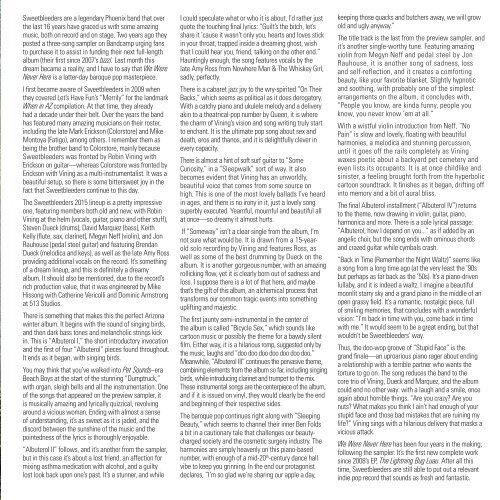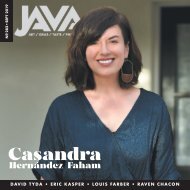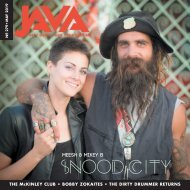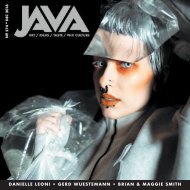Java.Dec.2.2015
You also want an ePaper? Increase the reach of your titles
YUMPU automatically turns print PDFs into web optimized ePapers that Google loves.
Sweetbleeders are a legendary Phoenix band that over<br />
the last 16 years have graced us with some amazing<br />
music, both on record and on stage. Two years ago they<br />
posted a three-song sampler on Bandcamp urging fans<br />
to purchase it to assist in funding their next full-length<br />
album (their first since 2007’s bzzz). Last month this<br />
dream became a reality, and I have to say that We Were<br />
Never Here is a latter-day baroque pop masterpiece.<br />
I first became aware of Sweetbleeders in 2009 when<br />
they covered Let’s Have Fun’s “Merrily” for the landmark<br />
When in AZ compilation. At that time, they already<br />
had a decade under their belt. Over the years the band<br />
has featured many amazing musicians on their roster,<br />
including the late Mark Erickson (Colorstore) and Mike<br />
Montoya (Fatigo), among others. I remember them as<br />
being the brother band to Colorstore, mainly because<br />
Sweetbleeders was fronted by Robin Vining with<br />
Erickson on guitar—whereas Colorstore was fronted by<br />
Erickson with Vining as a multi-instrumentalist. It was a<br />
beautiful setup, so there is some bittersweet joy in the<br />
fact that Sweetbleeders continue to this day.<br />
The Sweetbleeders 2015 lineup is a pretty impressive<br />
one, featuring members both old and new, with Robin<br />
Vining at the helm (vocals, guitar, piano and other stuff),<br />
Steven Dueck (drums), David Marquez (bass), Keith<br />
Kelly (flute, sax, clarinet), Megyn Neff (violin), and Jon<br />
Rauhouse (pedal steel guitar) and featuring Brendan<br />
Dueck (melodica and keys), as well as the late Amy Ross<br />
providing additional vocals on the record. It’s something<br />
of a dream lineup, and this is definitely a dreamy<br />
album. It should also be mentioned, due to the record’s<br />
rich production value, that it was engineered by Mike<br />
Hissong with Catherine Vericolli and Dominic Armstrong<br />
at 513 Studios.<br />
There is something that makes this the perfect Arizona<br />
winter album. It begins with the sound of singing birds,<br />
and then dark bass tones and melancholic strings kick<br />
in. This is “Albuterol I,” the short introductory invocation<br />
and the first of four “Albuterol” pieces found throughout.<br />
It ends as it began, with singing birds.<br />
You may think that you’ve walked into Pet Sounds–era<br />
Beach Boys at the start of the stunning “Dumptruck,”<br />
with organ, sleigh bells and all the instrumentation. One<br />
of the songs that appeared on the preview sampler, it<br />
is musically amazing and lyrically quizzical, revolving<br />
around a vicious woman. Ending with almost a sense<br />
of understanding, it’s as sweet as it is jaded, and the<br />
discord between the sunshine of the music and the<br />
pointedness of the lyrics is thoroughly enjoyable.<br />
“Albuterol II” follows, and it’s another from the sampler,<br />
but in this case it’s about a lost friend, an affection for<br />
mixing asthma medication with alcohol, and a guilty<br />
lost look back upon one’s past. It’s a stunner, and while<br />
I could speculate what or who it is about, I’d rather just<br />
quote the touching final lyrics: “Guilt’s the bitch, let’s<br />
share it ’cause it wasn’t only you, hearts and loves stick<br />
in your throat, trapped inside a dreaming ghost, wish<br />
that I could hear you, friend, talking on the other end.”<br />
Hauntingly enough, the song features vocals by the<br />
late Amy Ross from Nowhere Man & The Whiskey Girl,<br />
sadly, perfectly.<br />
There is a cabaret jazz joy to the wry-spirited “On Their<br />
Backs,” which seems as political as it does derogatory.<br />
With a catchy piano and ukulele melody and a delivery<br />
akin to a theatrical-pop number by Queen, it is where<br />
the charm of Vining’s vision and song writing truly start<br />
to enchant. It is the ultimate pop song about sex and<br />
death, eros and thanos, and it is delightfully clever in<br />
every capacity.<br />
There is almost a hint of soft surf guitar to “Some<br />
Curiosity,” in a “Sleepwalk” sort of way. It also<br />
becomes evident that Vining has an unworldly,<br />
beautiful voice that comes from some source on<br />
high. This is one of the most lovely ballads I’ve heard<br />
in ages, and there is no irony in it, just a lovely song<br />
superbly executed. Yearnful, mournful and beautiful all<br />
at once—so dreamy it almost hurts.<br />
If “Someway” isn’t a clear single from the album, I’m<br />
not sure what would be. It is drawn from a 15-yearold<br />
solo recording by Vining and features Ross, as<br />
well as some of the best drumming by Dueck on the<br />
album. It is another gorgeous number, with an amazing<br />
rollicking flow, yet it is clearly born out of sadness and<br />
loss. I suppose there is a lot of that here, and maybe<br />
that’s the gift of this album, an alchemical process that<br />
transforms our common tragic events into something<br />
uplifting and majestic.<br />
The first jaunty semi-instrumental in the center of<br />
the album is called “Bicycle Sex,” which sounds like<br />
cartoon music or possibly the theme for a bawdy silent<br />
film. Either way, it is a hilarious romp, suggested only by<br />
the music, laughs and “doo doo doo doo doo doo doo.”<br />
Meanwhile, “Albuterol III” continues the pervasive theme,<br />
combining elements from the album so far, including singing<br />
birds, while introducing clarinet and trumpet to the mix.<br />
These instrumental songs are the centerpiece of the album,<br />
and if it is issued on vinyl, they would clearly be the end<br />
and beginning of their respective sides.<br />
The baroque pop continues right along with “Sleeping<br />
Beauty,” which seems to channel their inner Ben Folds<br />
a bit in a cautionary tale that challenges our beautycharged<br />
society and the cosmetic surgery industry. The<br />
harmonies are simply heavenly on this piano-based<br />
number, with enough of a mid-20 th -century dance hall<br />
vibe to keep you grinning. In the end our protagonist<br />
declares, “I’m so glad we’re sharing our apple a day,<br />
keeping those quacks and butchers away, we will grow<br />
old and ugly anyway.”<br />
The title track is the last from the preview sampler, and<br />
it’s another single-worthy tune. Featuring amazing<br />
violin from Megyn Neff and pedal steel by Jon<br />
Rauhouse, it is another song of sadness, loss<br />
and self-reflection, and it creates a comforting<br />
beauty, like your favorite blanket. Slightly hypnotic<br />
and soothing, with probably one of the simplest<br />
arrangements on the album, it concludes with,<br />
“People you know, are kinda funny, people you<br />
know, you never know ’em at all.”<br />
With a wistful violin introduction from Neff, “No<br />
Pain” is slow and lovely, fl oating with beautiful<br />
harmonies, a melodica and stunning percussion,<br />
until it goes off the rails completely as Vining<br />
waxes poetic about a backyard pet cemetery and<br />
even lists its occupants. It is at once childlike and<br />
sinister, a feeling brought forth from the hyperbolic<br />
cartoon soundtrack. It finishes as it began, drifting off<br />
into memory and a bit of aural bliss.<br />
The final Albuterol installment (“Albuterol IV”) returns<br />
to the theme, now drawing in violin, guitar, piano,<br />
harmonica and more. There is a sole lyrical passage:<br />
“Albuterol, how I depend on you...” as if added by an<br />
angelic choir, but the song ends with ominous chords<br />
and crazed guitar while cymbals crash.<br />
“Back in Time (Remember the Night Waltz)” seems like<br />
a song from a long time ago (at the very least the ’90s<br />
but perhaps as far back as the ’50s). It’s a piano-driven<br />
lullaby, and it is indeed a waltz. I imagine a beautiful<br />
moonlit starry sky and a grand piano in the middle of an<br />
open grassy field. It’s a romantic, nostalgic piece, full<br />
of smiling memories, that concludes with a wonderful<br />
vision: “I’m back in time with you, come back in time<br />
with me.” It would seem to be a great ending, but that<br />
wouldn’t be Sweetbleeders’ way.<br />
Thus, the doo-wop groove of “Stupid Face” is the<br />
grand finale—an uproarious piano rager about ending<br />
a relationship with a terrible partner who wants the<br />
torture to go on. The song reduces the band to the<br />
core trio of Vining, Dueck and Marquez, and the album<br />
could end no other way: with a laugh and a smile, once<br />
again about horrible things. “Are you crazy? Are you<br />
nuts? What makes you think I ain’t had enough of your<br />
stupid face and those bad mistakes that are ruining my<br />
life?” Vining sings with a hilarious delivery that masks a<br />
vicious attack.<br />
We Were Never Here has been four years in the making,<br />
following the sampler. It’s the first new complete work<br />
since 2008’s EP, The Lightning Bug Luau. After all this<br />
time, Sweetbleeders are still able to put out a relevant<br />
indie pop record that sounds as fresh and fantastic.


















